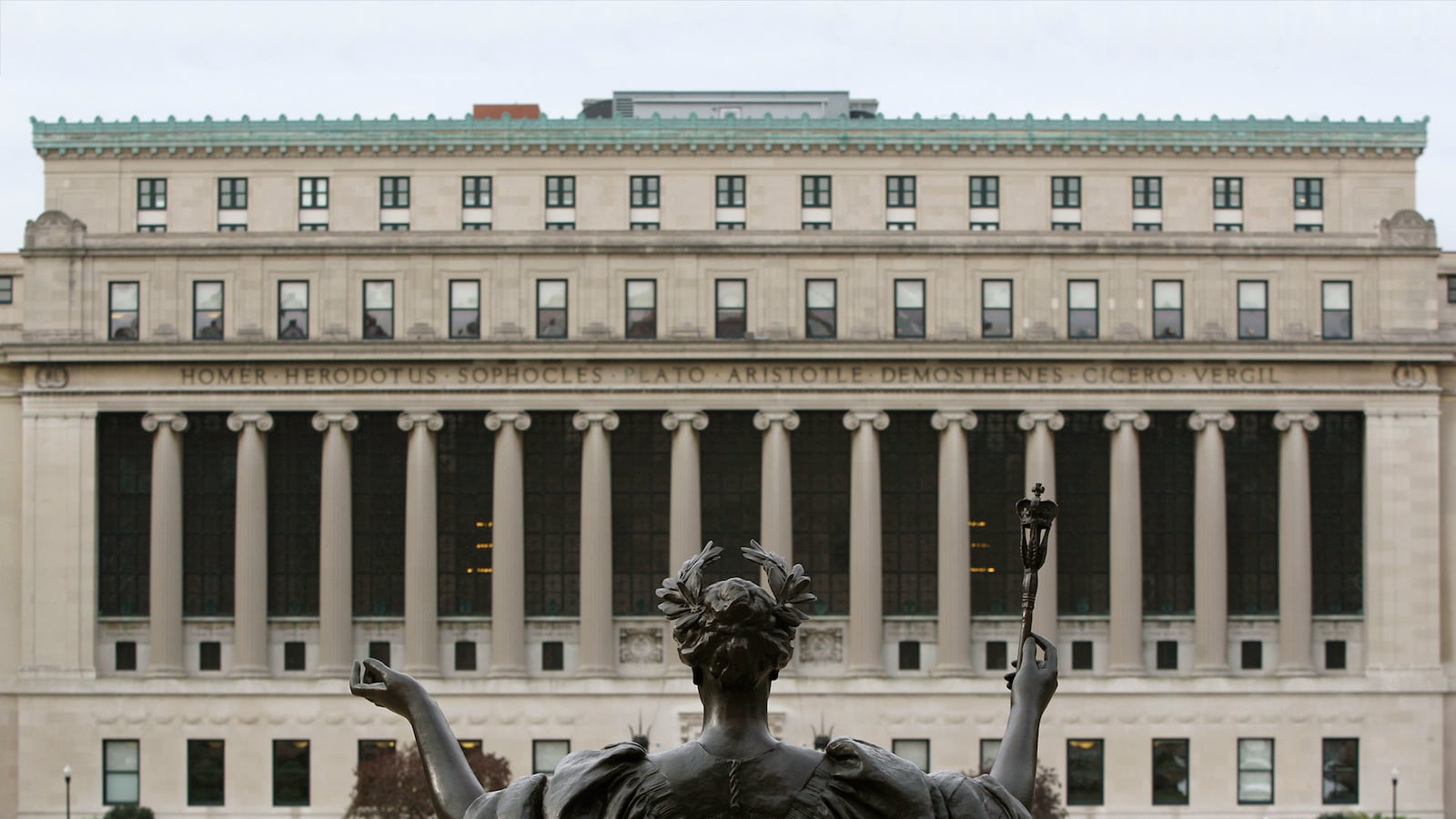The fake book in Columbia University’s Butler Library seemed like a too-obvious clue from an old detective novel. When opened, the hollowed-out copy of Thomas Hardy’s Tess of the d’Urbervilles revealed a box full of forms branded with an eagle. “Topics interested in,” the ominous questionnaire asked, “Post-Democracy,” “Nationalism,” and “Alternative Right.”
The book appeared to be a secret recruiting document for members of the alt-right, hidden in the sprawling stacks of a liberal college, until a library worker discovered it and reported it to the student publication Bwog this week. But the book’s alleged owners told The Daily Beast they waited all semester for a stranger to stumble on the tome. They claimed to represent members of the “Dark Enlightenment,” a grandiose name for a racist, anti-democratic, conservative movement that helped fuel the rise of 2016’s alt-right, neo-Nazi trolls.
They’re recruiting on college campuses across the country, they said. But they won’t show their faces; they need a safe space.
The Dark Enlightenment or “neoreaction” is a loose collection of anti-democratic, conservative ideas popularized in the early 2010s by writers like Nick Land and Curtis Yarvin (who writes under the name Menicus Moldbug). The movement, beloved of forums like Reddit and 8chan, calls for the upheaval of democracy and liberal ideology, and a return to a more autocratic rule. Believers often preach rigid race and gender binaries, and yearn for authoritarian leadership, be it at the hands of capitalist technocrats, monarchs, or politicians who appear fascistic in all but name.
But their alleged on-campus clubs are very touchy about being called fascists, or even being identified.
The Columbia University branch’s spokesperson used the screen name “DarkEn” to communicate with The Daily Beast and refused to give their real name, saying they didn’t harbor a “a death wish.”
“The Dark Enlightenment and certainly our group is opposed to fascism and ‘Nazism,’” DarkEn told The Daily Beast, in response to fellow students likening them to fascists and Nazis. To associate them with Nazis is “total journalistic irresponsibility,” DarkEn wrote.
The Dark Enlightenment takes itself more seriously than the anime Nazi sprawl of the alt-right, which Columbia’s alleged club maintains is an offshoot of Dark Enlightenment thinking. “That label came after ‘Dark Enlightenment,” DarkEn said of being called alt-right. “[T]hat is like calling a Tiger or a Lion a Liger.”
The Dark Enlightenment doesn’t even have good memes. But while these neo-reactionaries might consider themselves more philosopher-kings than meme-lords, they share the same slush of illiberal ideology as their alt-right cousins.
The group wants to stamp out “secular progressivism,” which they see “as a religion,” DarkEn said, referring to “The Cathedral,” a Dark Enlightenment concept that describes liberal, pro-democratic ideology as it exists in higher education.
In the language of the alt-right and much of Donald Trump’s base, this idea translates to the phantom menace of “political correctness.” So that’s how the Dark Enlightenment branded their college putsch.
Like a fraternity, the group’s pledge drive began in September, when students at Columbia University and New York University reported posters for the “Dark Enlightenment Club” hanging in their libraries. “Are you politically incorrect? We are,” the posters read, boasting of “weekly meetings.” The posters encouraged readers to contact the schools’ respective chapter heads on a secure messaging app.
The Daily Beast contacted the Columbia and NYU chapter heads, who claimed to be different people. They claimed to have branches at “some of the Ivy’s [sic] and a few others” including “NYU, Stanford and Yale [sic].” Both refused to disclose their identities or provide evidence of a Dark Enlightenment Club whose members met weekly.
Previous alt-right campaigns have hoaxed the city’s colleges, including NYU. In November 2015, a Facebook user created a page for an “NYU White Student Union,” sparking indignation and mockery on campus until the group was revealed to be the work of trolls from white supremacist websites, who did not attend the school.
But the alleged “Dark Enlightenment Club” had at least one member with access to Columbia’s and NYU’s libraries. (Columbia and NYU share some library privileges, so a student at one campus could have access to the other.)
The hollow book discovered at Columbia contained manila envelopes with what appeared to be application forms, Bwog reported. The outside was emblazoned with a stylized eagle, reminiscent of those adopted by fascist regimes. The inside asked applicants to complete a form with their time availability and whether they were interested in “leadership position[s].”
The form also asked about the respondents’ interests from a list of “post-democracy,” “nationalism,” “HBD,” “alternative right,” “cultural Marxism,” “‘The Cathedral,’” “economic systems,” and “other.”
“HBD” stands for “human biodiversity,” a faux-scientific concept that claims races are inherently distinct and have different characteristics like intelligence and values, and is used to justify racial inequality by attributing it to genetics rather than structural racism.
(DarkEn argued that HBD does “not make the claim that any race is superior,” then suggested that high IQ scores among Asian people could be attributed to Chinese genetic programs, and that races might have inherently different values.)
The Dark Enlightenment Club placed the book in the Columbia library at the beginning of the semester, hoping it would be found and inspire others to join their movement, DarkEn said.
But while the Dark Enlightenment Club was able to prove its connections to a large Dark Enlightenment forum, spokespersons for NYU and Columbia declined to offer evidence of the group’s size or existence on campus. DarkEn also declined to connect The Daily Beast with other alleged branches outside Manhattan.
“We have members in high places who could vouch,” the club’s NYU leader told The Daily Beast, while declining to give his name or those of anyone in the group.
He vehemently denied that his group was “safe space.”






